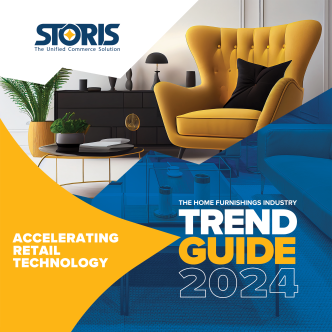Two Industry Experts Seeing Positive Signs for Economy’s Future
January 24th, 2024 by the STORIS Marketing Team
[Mt. Arlington, NJ 2024] – Two major players in the furniture industry are seeing positive signs for our economy’s future. During rising interest rates, inflation, and the hangover that lingers from a pandemic era, Editor in Chief of Furniture Today, Bill McLoughlin, recently wrote in an editorial letter how there is a hope for the long-term outcome of furniture retail, even if the short-term can appear grim. However, Bill was quick to point out an important distinction in his thought process.
“Hopefulness is different than optimism,” McLoughlin elaborated. “The industry has always typically been ‘cautiously optimistic,’ meaning we recognize challenges but also the relative optimism that a company can surmount them.”
Bill further explained how this optimism has been founded on proven strategies, usually leading to a turnaround within 3-6 months. However, the pandemic’s unique challenges have thrown these established patterns into disarray.
“The pandemic effect is still with us and will continue to be felt in one way or another for several years,” Bill noted. This lingering impact necessitates a new approach, one that aligns with the evolving demographics and buying behaviors of consumers.
“Study the demographics,” explained McLoughlin.
With Millennials now the largest generation in history, they are entering their prime furniture purchasing years. “They are moving out of their parents’ homes, starting families, and setting up their first households.” Embracing the potential of this vast consumer base is essential for the future of the furniture retail industry.
Donnie Surdoval, Sr. Vice President of Product Strategy at STORIS, Inc., a major software provider to some of the top companies in the furniture industry, had additional comments to share on the economy’s future, emphasizing how this generation seeks out other factors beyond price when making purchasing decisions.
“There is less price elasticity with consumers now. They consider their shopping experience, credit offers, and whether it meets their aesthetic.”
This, according to Surdoval, is a good thing. “In a sea of bad news, there are good things that are going on,” Surdoval shared.
“Millennials have become our biggest pool of consumers, and this shift allows the industry to respond with strategic price adjustments and redirect consumer attention to these factors.”
The need to adapt to these current trends to remain relevant “must be the pivotal driver of change for the industry to enhance the customer experience and operational efficiency.”
Technology also has a pivotal role to play in the future of furniture retail, a space STORIS serves its partners well. Surdoval stressed the potential of purpose-specific AI applications in streamlining operational processes and enhancing customer experiences, while McLoughlin noted that the impact of AI could be as significant as the cultural shift brought about by the internet.
While the furniture industry acknowledges that it may trend a bit slower when it comes to technological innovation, both McLoughlin and Surdoval agree that investments in these technologies and the millennial consumer utilizing said technology will bridge that gap.
“With the digital transformation of retail, the ability to accurately communicate product detail, availability, and pricing in online experiences became table-stakes,” explained Surdoval. “And we think today that the ability to follow this up with an in-store experience that is just as enjoyable, clear, and easy is also now table-stakes.”
Table-stakes is what businesses define as the minimum requirements to have a competitive position in a market or industry. Although hope is not a table-stakes in the furniture retail business, it can inspire it to keep providing exceptional experiences for consumers, a table stakes this industry has thrived in for generations.

Industry leaders weighed in on these integral topics in the STORIS’ 2024 Trend Guide. Download your exclusive copy of the Trend Guide here.
STORIS 2024 Trend Guide